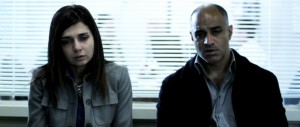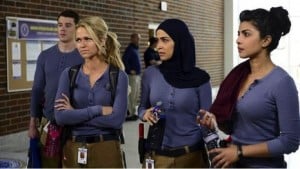After reading the synopsis of Torn , a film written by Michael Richter and directed by Jeremiah Birnbaum, I thought: Oooh, this might be yet another film on the post 9/11 era, blaming the Muslim community for all evil things that happened, and echoing all sorts of stereotypes that have defined America’s perceptions of Muslims around the world.

But Richter and Birnbaum proved me wrong. After watching Torn, I believe cinema can still surprise us with bold ideas and out-of-the-box unorthodoxy. I see this film as a liberating experience that would certainly make me re-think the very notion of stereotyping as it applies to Arabs and Muslims in American fiction films.
Torn tells the story of two American families whose sons are killed in a terrorist mall bombing. The two mothers, one of whom is a Muslim, find comfort in each other. Developments in the storyline show that the 16-year old Muslim boy is suspected to have played a role in the bombing, leading to a turbulent relationship between the two women.
The film provides some interesting thoughts on how cinema could change our perception of other cultures and nations. Miriam, the Muslim women of Pakistani origins, does not look like a stranger in the community where she has lived in for her entire life. She is a realtor who dresses like many other middle-class American women. She and her husband share a very intimate relationship, as the early scenes of the film suggest.
“Portraying Miriam this way is something we have agreed upon from the beginning,” says Torn screenwriter Michael Richter, when I interviewed him about the film. “Anyone who will go to watch the film will have this preconceived notion of who did it. I wanted Miriam to look like everyone else, and be a rational person. When people look at her, I want them to say they don’t believe this person did it… She is like everyone else.”
The director of the film, Jeremiah Birnbaum, concurs on the same thought:
“We were interested in a uniquely American story, and she is really someone who follows American culture. It seems to fit the story and speaks to us in a better way. That is why we all know such a film depends on how great the actors are. We spent a lot of time casting, looking for actors who go deep in this role.”
The film delivers a message of tolerance and acceptance, so it seems natural to see Lea, the other woman, finding comfort in talking to Miriam, and lending her a hand to go through this crisis together. The two women come from different cultural and religious backgrounds, as the film shows, but both are mothers who lost their sons in one terrible incident. Their shared agony seems to have eroded their cultural differences as they grieved over lost sons.
Richter and Birnbaum told me their aim was to take the audience on their own journeys, and then come out and question their own beliefs and prejudices.
In view of her chaotic past, Lea looks more disoriented and desperate. While she is furious at Walter, Miriam’s son, for being a suspect in the bombing incident, she still defends him in front of the FBI. Maybe that is her way of passing a message to us, saying: “you might have your suspicions inside of you, but it would be wrong to express them in public, especially when you don’t have the whole story of what really happened.”
The two women in the film seem to possess a sort of ambivalence towards what happened. While they are confident of how well they raised their sons, the two mothers were still uncertain about society’s new perceptions of their two boys. Miriam, for example, looks highly defiant as she defends her son when neighbors turn more hostile towards her family after Walter is held up by the FBI as suspect. In the meantime, she herself questions her son’s behavior when she learns about his suspiciously frequent visits to the mosque without her knowing about it.
“I think characters become more interesting when they are internally conflicting. This conflict shows the difference between personal and societal levels,” says Richter.
Nevertheless, the film puts so much emphasis on the idea of Walter being suspected for the explosion – through the conversations the FBI agents have with both women, the newspapers articles on Walter, and then Miriam discovering her son visiting the mosque very often recently – that it becomes repetitive at times and takes away from other elements of the plot.
When I talked to Richter about this, he said: “I think it was important to add this piece of information to the film, as it helps the plot, and building the characters.”
Reflecting on what is really happening in America, Torn provides a real example of real stories that have taken place through the last 12 years. According to Muslim Advocates, an American organization that works to guarantee freedom and justice for Americans of all faiths, hate crimes against Muslims in America jumped by 50% in 2010. Twenty-two percent of respondents to a USA Today/Gallup poll revealed that “they would not want Muslims as neighbors.”
“The two women in the film deal with so many things happening in the world around them. We tried to show what families go through in such situation, and the fact that they are not allowed to deal with their own grief after what happened to their sons,” says the film director.
“There are so many negative stories out there. We wanted to tell a story that could be a counterpoint to that, and add a very positive message,” adds Birnbaum.
Overall, Torn is a powerful work that aims at rethinking the way we deal with our surrounding. It passes a message of acceptance of the other, but most importantly, hopes its audience will come out thinking about its story, and reflecting it on their own lives.












